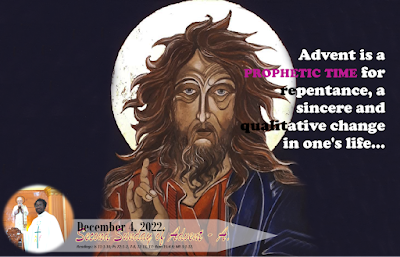YOU AND LAZARUS.
September 25, 2022
Twenty-sixth Sunday in Ordinary Time – C.
Readings: Am 6:1a, 4-7; Ps 146:7, 8-9, 9-10; 1 Tm 6:11-16; Lk 16:19-31.“There was a rich man who dressed in purple garments and fine linen and dined sumptuously each day. And lying at his door was a poor man named Lazarus…”
A German proverb says: “A poor person isn't he who has little, but he who needs a lot.” And a Chinese proverb adds: “Rich men accumulate money; the poor accumulate years.”
“The Catholic Church prone and makes the eulogies of poverty.” That is what many people believe and say. Because they hear the Church saying "Blessed are poor." And that "God is the friend of the poor." And because we sing lovingly and joyful, "The Lord hears the cries of the poor..." So, their conclusion is direct, the Church promotes poverty and hates the rich.
Is that truth? Does the Church says that poverty is a blessing? Why then the mission she entrusts to Caritas and the many Religious Congregations and Institutes to fight poverty and raise the level of the poor, the outcasts, the marginalized, and the forsaken of our societies? If the Church eulogies poverty, why then her callings and fights for social justice? What really is poverty and why do we have poor people in our world?
May we start saying that poverty is human creation. God has not created man to be poor. It is the society that manufactures the poor through the systems and the politics we implement. God has created man. Man, through his skills has invented economics, politics, and social classifications. And from those human inventions came the concepts of poverty and riches, or the poor and rich... and so the many Lazarus versus the nameless oligarchs and billionaires.
Today's readings sound a challenge to you and me on our thinking about poverty and riches. The Prophet Amos, the singer of social justice accuses the rich who because of their riches despise the poor and those who have closed their heart and eyes to the needs of the neighbors and who rely only on their possessions.
If your riches leads you to indifference and to close yourself away from others, you run the risk of damnation. Not that it is evil to be rich, but material possessions should be instruments, as the Lord said last Sunday to make friends and assure our future.
The parable of the poor Lazarus and the rich man clearly tells what it is all about. The Lord does not accuse and condemn the man for being rich, but rather for his indifference towards Lazarus who not only was materially poor, but was also in miserable situation: full of sores, hungry, and licked by dogs... Two elements about this parable: the first, the poor is named, Lazarus while the rich is nameless. The second element, that they both died. Lazarus first, and carried away by Angels and the rich second, but was only buried on earth.
Here comes the ground of the Church teaching about the poor. Though humanly we forsake them and treat them with indifference, God has not forsaken or abandoned the poor. Their situation is not a divine punishment. They are poor because of our egoism and indifference, because of corruption and the lack of equity and justice in the world. The presence of poor people amidst us should always be seen as a warning to us and a calling for charity and service. Your neighbor, the Lazarus is there to remind you the true values of humanity that, oftentimes, materialism and the thirst of money make you forget. And the poor has a name. he is Lazarus, the "Friend of God". So, if you wish one day to be welcomed into God's presence, you better welcome today his friends into your life and into your house. We are urged to serve the Lord through serving the needy.
Your Lazarus today are the migrants you meet around, the street children, the beggars, the disables people, the homeless, and all those in need that you see around. It is through them will the Lord judge you, through what you did or failed to do to them.
May we never forget this truth, the root of all our social problems today and since of old is the evil use we make of material possessions, of money. As Christians, we should live as Paul recommends: "aim at righteousness, godliness, faith, love, steadfastness, gentleness." This does not oppose the possession of material and money but it orients our attitudes toward them. May we make of money an instrument not a master... For, says the proverb, “Money is a good servant, but a bad master.”





Comments
Post a Comment